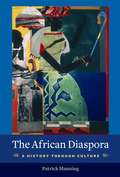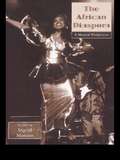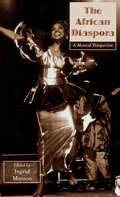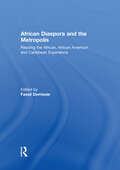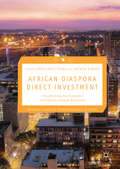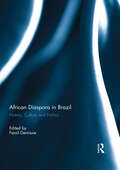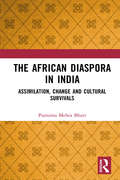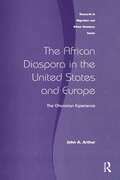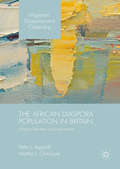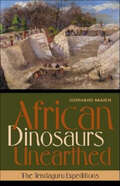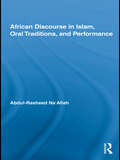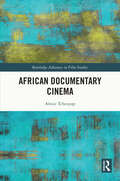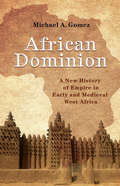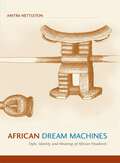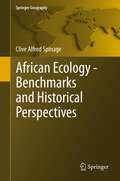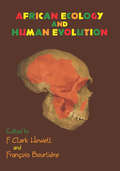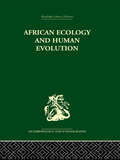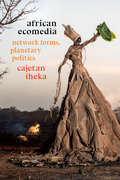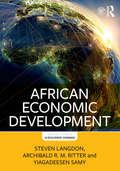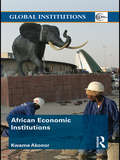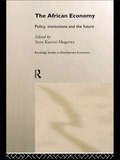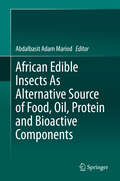- Table View
- List View
The African Diaspora: A History Through Culture (Columbia Studies in International and Global History)
by Patrick ManningPatrick Manning refuses to divide the African diaspora into the experiences of separate regions and nations. Instead, he follows the multiple routes that brought Africans and people of African descent into contact with one another and with Europe, Asia, and the Americas. In weaving these stories together, Manning shows how the waters of the Atlantic Ocean, the Mediterranean Sea, and the Indian Ocean fueled dynamic interactions among black communities and cultures and how these patterns resembled those of a number of connected diasporas concurrently taking shape across the globe. Manning begins in 1400 and traces five central themes: the connections that enabled Africans to mutually identify and hold together as a global community; discourses on race; changes in economic circumstance; the character of family life; and the evolution of popular culture. <P><P>His approach reveals links among seemingly disparate worlds. In the mid-nineteenth century, for example, slavery came under attack in North America, South America, southern Africa, West Africa, the Ottoman Empire, and India, with former slaves rising to positions of political prominence. Yet at the beginning of the twentieth century, the near-elimination of slavery brought new forms of discrimination that removed almost all blacks from government for half a century. Manning underscores the profound influence that the African diaspora had on world history, demonstrating the inextricable link between black migration and the rise of modernity, especially in regards to the processes of industrialization and urbanization. A remarkably inclusive and far-reaching work, The African Diaspora proves that the advent of modernity cannot be imaginatively or comprehensively engaged without taking the African peoples and the African continent as a whole into account.
African Diaspora: A Musical Perspective (Critical and Cultural Musicology)
by Ingrid MonsonThe African Diaspora presents musical case studies from various regions of the African diaspora, including Africa, the Caribbean, Latin America, and Europe, that engage with broader interdisciplinary discussions about race, gender, politics, nationalism, and music.
The African Diaspora: A Musical Perspective (Critical and Cultural Musicology)
by Ingrid MonsonThe African Diaspora presents musical case studies from various regions of the African diaspora, including Africa, the Caribbean, Latin America, North America, and Europe, that engage with broader interdisciplinary discussions about race, gender, politics, nationalism, and music. Featured here are jazz, wassoulou music, and popular and traditional musics of the Caribbean and Africa, framed with attention to the reciprocal relationships of the local and the global.
African Diaspora and the Metropolis: Reading the African, African American and Caribbean Experience
by Fassil DemissieAt the end of the 19th and at the beginning of the 20th century, a number of African American and Caribbean intellectuals and immigrants of the African Diaspora with all their apprehensions set out in steamships en route and carried with them a certain presence to the metropoleis of Europe and North America. These individuals traversed the "middle passage" in the opposite direction from the forced journey undertaken by their enslaved ancestors. Later they began to arrive in large numbers as free men and women in London, Paris, Berlin, Madrid, Brussels, Lisbon, New York, and other places in the metropolis by steam ships and later by planes, and were actors in the larger history of empire from which the imperatives of forced migration, uprooting, displacement, and exile had arisen.The texts selected offer critical examination of a broad range of African Diaspora experiences in the metropole drawn from Senegal, the Caribbean, United States, Britain, Nigeria and France. Bringing together comparative and diasporic perspectives, the book explores the complex roles that race, gender, sexuality and history have played in the formation of African Diaspora identities in the metropole since the 19th century.This book was published as a special issue of African and Black Diaspora: An International Journal.
African Diaspora Direct Investment: Establishing The Economic And Socio-cultural Rationale (Palgrave Studies Of Entrepreneurship In Africa)
by Dieu Hack-Polay Juliana Siwale<P>Examining the experiences of Africans setting up businesses back home, the main focus of this book is to establish the economic, social and psychological reasons for such ‘home direct investment’. <P>Despite the personal sacrifices that are often needed in order to set up new ventures, the diaspora invests relentless effort and motivations in the pursuit of home ventures. <P>The authors explore critical areas such as the social and psychological pressures that African Diasporas experience when investing in their home countries, as well as the management of diaspora businesses and the impact of such investment to local economies.
African Diaspora in Brazil: History, Culture and Politics
by Fassil DemissieThe term 'Black Atlantic' was coined to describe the social, cultural and political space that emerged out of the experience of slavery, exile, oppression, exploitation and resistance. This volume seeks to recast a new map of the 'Black Atlantic' beyond the Anglophone Atlantic zone by focusing on Brazil as a social and cultural space born out of the Atlantic slave trade.The contributors draw from the recently reinvigorated scholarly debates which have shifted inquiry from the explicit study of cultural 'survival' and 'acculturation' towards an emphasis on placing Africans and their descendants at the center of their own histories. Going beyond the notion of cultural 'survival' or 'creolization', the contributors explore different sites of power and resistance, gendered cartographies, memory, and the various social and cultural networks and institutions that Africans and their descendants created and developed in Brazil. This book illuminates the linkages, networks, disjunctions, sense of collective consciousness, memory and cultural imagination among the African-descended populations in Brazil.This book was originally published as a special issue of African and Black Diaspora: An International Journal.
The African Diaspora in India: Assimilation, Change and Cultural Survivals
by Purnima Mehta BhattThis book explores the understudied and often overlooked subject of African presence in India. It focuses on the so-called Sidis, Siddis or Habshis who occupy a unique place in Indian history. The Sidis comprise scattered communities of people of African descent who travelled and settled along the western coast of India, mainly in Gujarat, but also in Goa, Karnataka, Andhra Pradesh, Sri Lanka and in Sindh (Pakistan) as a result of the Indian Ocean trade from the thirteenth to nineteenth centuries. The work draws from extant scholarly research and documentary sources to provide a comprehensive study of people of African descent in India and sheds new light on their experiences. By employing an interdisciplinary approach across fields of history, art, anthropology, religion, literature and oral history, it provides an analysis of their negotiations with cultural resistance, survivals and collective memory. The author examines how the Sidi communities strived to construct a distinct identity in a new homeland in a polyglot Indian society, their present status, as well as their future prospects. The book will interest those working in the fields of history, sociology and social anthropology, cultural studies, international relations, and migration and diaspora studies.
The African Diaspora in the United States and Europe: The Ghanaian Experience (Research in Migration and Ethnic Relations Series)
by John A. ArthurThis book systematically documents the experiences of Ghanaian communities in North America as a case study of the new African migration. The rapid increase in the number of Ghanaians lawfully admitted as permanent residents since 1980 offers an opportunity to investigate their immigrant journeys, their membership in the larger society and the expression of their individual and collective social identities. Using original empirical data from the US and Canada as well as comparative material from the UK and the Netherlands, the author also investigates the relationship between these new African migrants and the native-born black diaspora in the US. This study balances theoretical insight with policy implications, using the case-study as a lens not just on African migration but also on significant conceptual themes in migration studies including transnationalism, identity, social networks, remittances, economic integration and citizenship.
The African Diaspora Population in Britain
by Peter J. Aspinall Martha Judith ChinouyaThis insightful book examines the Black African diaspora in Britain through an examination of its demography, recent patterns of migration, changing patterns of residence, and socio-economic position. It provides an analysis of the areas where Black Africans face disadvantage, including labour market participation, housing markets, health and social care, and residence in deprived neighbourhoods. This original and important research also deals with categories and identities, using data collected in the 2011 Census on national identity, and the resulting investigation of the social, cultural and civic life of Black Africans presents the substantial heterogeneity concealed in the label 'Black African', concluding by highlighting the policy implications of this vital research.
African Dinosaurs Unearthed: The Tendaguru Expeditions (Life of the Past)
by Gerhard MaierFrom 1907 to 1931 at Tendaguru, a remote site in present-day Tanzania, teams of German (and later British) paleontologists unearthed 220 tons of fossils, including the bones of a new dinosaur, one of the largest then known. For decades the mounted skeleton of this giant, Brachiosaurus, was the largest skeleton of a land animal on exhibit in the world. The dinosaur and other animal fossils found at Tendaguru form one of the cornerstones of our understanding of life in the Mesozoic era. Visited sporadically during the '30s and '40s, Tendaguru again became the site of scientific interest late in the 20th century. African Dinosaurs Unearthed tells the story of driven scientific adventurers working under difficult conditions and often paying the price with their health—and sometimes with their lives. Set against the background of a troubled century, the book reveals how scientific endeavors were carried on through war and political turmoil, and continue into the present day.
African Discourse in Islam, Oral Traditions, and Performance (African Studies)
by Abdul-Rasheed Na'AllahThrough an engaged analysis of writers such as Wole Soyinka, Ola Rotimi, Niyi Osundare, and Tanure Ojaide and of African traditional oral poets like Omoekee Amao Ilorin and Mamman Shata Katsina, Abdul-Rasheed Na'Allah develops an African indigenous discourse paradigm for interpreting and understanding literary and cultural materials. Na'Allah argues for the need for cultural diversity in critical theorizing in the twenty-first century. He highlights the critical issues facing scholars and students involved in criticism and translation of marginalized texts. By returning the African knowledge system back to its roots and placing it side by side with Western paradigms, Na'Allah has produced a text that will be required reading for scholars and students of African culture and literature. It is an important contribution to scholarship in the domain of mobility of African oral tradition, and on African literary, cultural and performance discourse.
African Documentary Cinema: Beyond Representation (Routledge Advances in Film Studies)
by Alexie TcheuyapAfrican Documentary Cinema investigates the inception and trajectory of contemporary documentary filmmaking in sub-Saharan African countries and their diasporas. The book challenges critical paradigms that have long prevailed in African film criticism, shedding light on the diverse discourses and evolving aesthetic trends present within documentary films.Situating his analysis within the context of the significant transformation of the African film industry, the author focuses on the development, diversity, and shifting dynamics that have impacted contemporary documentary cinema. Examining the historical, political, sociological, economic, and cultural factors that have facilitated the rise of documentary films—especially those created by female documentarians—the book assesses the emergence of documentary filmmakers spanning different generations. Their training, practices, and innovative perspectives on social, political, and environmental issues ultimately give rise to new frameworks for understanding the bio-documentary genre, issues of gender discrimination, LGBTQIA+ identities, environmental trauma, genocide, and memory on the African continent.This ground-breaking study offers new insight into a rapidly expanding topic and will appeal to students and scholars in the fields of film studies, documentary film, media industry studies, African studies, French, postcolonial studies, politics, and cultural studies.
African Dominion: A New History of Empire in Early and Medieval West Africa
by Michael A. GomezA groundbreaking history that puts early and medieval West Africa in a global contextPick up almost any book on early and medieval world history and empire, and where do you find West Africa? On the periphery. This pioneering book, the first on this period of the region’s history in a generation, tells a different story. Interweaving political and social history and drawing on a rich array of sources, including Arabic manuscripts, oral histories, and recent archaeological findings, Michael Gomez unveils a new vision of how categories of ethnicity, race, gender, and caste emerged in Africa and in global history more generally. Scholars have long held that such distinctions arose during the colonial period, but Gomez shows they developed much earlier.Focusing on the Savannah and Sahel region, Gomez traces the exchange of ideas and influences with North Africa and the Central Islamic Lands by way of merchants, scholars, and pilgrims. Islam’s growth in West Africa, in tandem with intensifying commerce that included slaves, resulted in a series of political experiments unique to the region, culminating in the rise of empire. A major preoccupation was the question of who could be legally enslaved, which together with other factors led to the construction of new ideas about ethnicity, race, gender, and caste—long before colonialism and the transatlantic slave trade.Telling a radically new story about early Africa in global history, African Dominion is set to be the standard work on the subject for many years to come.
African Dream Machines: Style, Identity and Meaning of African Headrests
by Anitra NettletonAfrican Dream Machines takes African headrests out of the category of functional objects and into the more rarefied category of ‘art’ objects. Styles in African headrests are usually defined in terms of western art and archaeological discourses, but this book interrogates these definitions of style and demonstrates the shortcomings of defining a single formal style model as exclusive to a single ethnic group. Among the artefacts made by southern African peoples, headrests were the best known. Anitra Nettleton’s study of the uses and forms of headrests opened up a number of art-historical methodologies in the attempt to gain an understanding of form, style and content in African art objects. Her drawings of each and every headrest encountered become a major part of the project.
The African Dustbin Grade 10 Drama: UBC contracted
by Victor C.D. MtubaniThe story itself is based on the strong idea that the African continent must not allow itself to be the dumping ground, a dustbin for the waste which other people created, but can no longer manage. It is a play which is unashamedly Afro-centric. Above all the literary details is the symbolism in the title, The African Dustbin. Many readers have found the title strange, funny and even silly. That is, initially. When they read the story fully, they then appreciate the metaphor of a dustbin, where people throw all kinds of rubbish. The question arises, whether Africa should allow itself to be, metaphorically, a dustbin. Features include: Introduction: Points to central features to look out for as the plot develops Enrichment activities: Short activities to assist the learner to deal with the concepts of the drama and prepare learners for longer questions.
The African Dustbin Grade 10 Drama: UBC uncontracted
by Victor C.D. MtubaniThe story itself is based on the strong idea that the African continent must not allow itself to be the dumping ground, a dustbin for the waste which other people created, but can no longer manage. It is a play which is unashamedly Afro-centric. Above all the literary details is the symbolism in the title, The African Dustbin. Many readers have found the title strange, funny and even silly. That is, initially. When they read the story fully, they then appreciate the metaphor of a dustbin, where people throw all kinds of rubbish. The question arises, whether Africa should allow itself to be, metaphorically, a dustbin. Features include: Introduction: Points to central features to look out for as the plot develops Enrichment activities: Short activities to assist the learner to deal with the concepts of the drama and prepare learners for longer questions.
African Ecology: Benchmarks and Historical Perspectives (Springer Geography)
by Clive Alfred SpinageIn view of the rapidly changing ecology of Africa ,this work provides benchmarks for some of the major, and more neglected, aspects, with an accent on historical data to enable habitats to be seen in relation to their previous state, forming a background reference work to understanding how the ecology of Africa has been shaped by its past. Reviewing historical data wherever possible it adopts an holistic view treating man as well as animals, with accent on diseases both human and animal which have been a potent force in shaping Africa's ecology, a role neglected in ecological studies.
African Ecology and Human Evolution
by F. Clark Howell Francois BourliereThe record of man's early evolution, though still fragmentary, is more complete on the African continent than anywhere else in the world. The ecological context of this evolution, however, has been studied intensively only in recent years. This pioneering volume draws together eminent specialists from many fields--physical anthropologists, zoologists, geologists, paleontologists, and prehistorians--who summarize here the results of their diverse research on Pleistocene environments and the cultural and biological evolution of man in Africa.This volume was sponsored by the Wenner-Gren Foundation for Anthropological Research Inc., which met at Burg Wartenstein, Austria. The editors have field experience in Africa, especially eastern and equatorial Africa. This experience is coupled with their awareness of the need to integrate results of numerous field studies bearing on the biological-behavioral evolution of higher primates with other field studies on the paleoecology and the mammalian ecology of sub-Saharan Africa.The book includes contributions on Pleistocene stratigraphy and climatic changes throughout the African continent; on the origin and evolution of the earliest man-like creatures in Africa; on the dating, distribution, and adaptation of Pleistocene hunter-gatherer peoples; and on the ecology, biology, and social behavior of African primate and human populations. The chapters reflect vividly the state of current knowledge at the time and indicate paths for future research. Over 100 maps and figures, detailed bibliographies, and a comprehensive index contribute to the importance of the volume for basic reference use.
African Ecology and Human Evolution
by F. Clark Howell François BourlièreThis pioneering volume summarizes the results of diverse research on Pleistocene environments and the cultural and biological evolution of man in Africa. The book includes chapters on Pleistocene stratigraphy and climatic changes throughout the African continent; on the ecology, biology and sociology of African primate and human populations. Contributors include: C. Arambourg, P. Biberson, W. W. Bishop, Geoffrey Bond, F. Bourlière, Karl W. Butzer, Desmond Clark, H. B. S. Cooke, Irven DeVore, John T. Emlen, A. T. Grove, J. de Heinzelin, J. Hiernaux, Clark Howell, L. S. B. Leakey, I. Liben, T. Monod, R. F. Moreau, R. A. pullan, J. T. Robinson, George B. Schaller, S. L. Washburn. Originally published in 1964.
African Ecomedia: Network Forms, Planetary Politics
by Cajetan IhekaIn African Ecomedia, Cajetan Iheka examines the ecological footprint of media in Africa alongside the representation of environmental issues in visual culture. Iheka shows how, through visual media such as film, photography, and sculpture, African artists deliver a unique perspective on the socioecological costs of media production, from mineral and oil extraction to the politics of animal conservation. Among other works, he examines Pieter Hugo's photography of electronic waste recycling in Ghana and Idrissou Mora-Kpai's documentary on the deleterious consequences of uranium mining in Niger. These works highlight not only the exploitation of African workers and the vast scope of environmental degradation but also the resourcefulness and creativity of African media makers. They point to the unsustainability of current practices while acknowledging our planet's finite natural resources. In foregrounding Africa's centrality to the production and disposal of media technology, Iheka shows the important place visual media has in raising awareness of and documenting ecological disaster even as it remains complicit in it.
African Economic Development (Routledge Textbooks in Development Economics)
by Steven Langdon Archibald R.M. Ritter Yiagadeesen SamySub-Saharan Africa is at a turning point. The barriers to economic growth seen in the 1980-2000 era are disappearing and new optimism is spreading. However, difficult goals of eliminating poverty, achieving equity and overcoming environmental threats continue. This much-needed and insightful textbook has been written to help us understand this combination of emerging improvements and significant challenges. Opening with an analysis of the main theories relating to development in Sub-Saharan Africa, the book explores all the key issues, including: Human development; Rapid urbanization; Structural and gender dimensions; Sustainable development and environmental issues; and Africa’s role in the world economy. The authors use economic tools and concepts throughout, in a way that makes them accessible to students without an economics background. Readers are also aided by a wide range of case studies, on-the-ground examples and statistical information, which provide a detailed analysis of each topic. This text is also accompanied by a companion website, featuring additional sources for students and instructors. African Economic Development is a clear and comprehensive textbook suitable for courses on African economic development, development economics, African studies and development studies.
African Economic Institutions (Global Institutions)
by Kwame AkonorThis book analyzes how, and under what conditions, African International Economic Organizations (IEO) have evolved, and what individual and collective contributions, if any, these African IEOs have had on Africa’s socio-economic development. Providing a comprehensive and accessible overview, the book covers the continent’s main IEOs, The United Nations Economic Commission on Africa, The African Development Bank; and The New Partnership for Africa’s Development as well as the five major Regional Economic Communities, including Economic Community of West African States, and Southern African Development Community. Assessing the degree to which African IEO’s have been able to chart their own course in coming up with their development agendas and priorities rather than following the lead of Global Institutions, this book: Provides a descriptive and analytical overview of the historical and contemporary development blueprints produced for Africa Clearly examines the contribution made by African economic institutions towards development Considers whether African economic institutions are building blocks or stumbling blocks in Africa’s development Offers a detailed evaluation and critique of African IEOs Enabling the reader to reach a deeper understanding of the challenges and potentials of development on the African continent, African Economic Institutions will be of interest to all students and scholars of African politics and development studies.
African Economies and the Politics of Permanent Crisis, 1979-1999
by Nicolas Van De WalleThis 2001 book explains why African countries have remained mired in a disastrous economic crisis since the late 1970s. It shows that dynamics internal to African state structures largely explain this failure to overcome economic difficulties rather than external pressures on these same structures as is often argued. Far from being prevented from undertaking reforms by societal interest and pressure groups, clientelism within the state elite, ideological factors and low state capacity have resulted in some limited reform, but much prevarication and manipulation of the reform process, by governments which do not really believe that reform will be effective, which often oppose reforms because they would undercut the patronage and rent-seeking practices which undergird political authority, and which lack the administrative and technical capacity to implement much reform. Over time, state decay has increased.
The African Economy: Policy, Institutions and the Future (Routledge Studies in Development Economics #No.13)
by Steve Kayizzi-MugerwaThis book offers an in-depth analysis of the current state of the African economy and makes constructive suggestions about its future direction. The contributors argue that despite enduring challenges such as food security and employment creation, Africa faces a brighter future in sustainable growth provided that governance and policy- making are effectively employed to maintain peace, achieve greater regional collaboration and encourage private sector competitiveness.
African Edible Insects As Alternative Source of Food, Oil, Protein and Bioactive Components
by Abdalbasit Adam MariodThe harvesting, processing and consumption of edible insects is one of the main keys to the sustainability of food chains on the African continent. Insects are the largest and most successful group of animals on the planet and it is estimated that they comprise 80% of all animals. This makes edible insects extremely important to the future survival of large populations across Africa and the world. Insects offer a complete animal protein that includes all 9 essential amino acids and are very competitive with other protein sources. They are also a good source of beneficial unsaturated fats, and many insects have a perfect Omega 3:6 balance. African Edible Insects As Alternative Source of Food, Oil, Protein and Bioactive Components comprehensively outlines the importance of edible insects as food and animal feed and the processing of insects in Africa. The text also highlights indigenous knowledge of edible insects and shows the composition and nutritional value of these insects, plus presents reviews of current research and developments in this rapidly expanding field. All of the main types of edible insects are covered, including their nutritional value, chemical makeup, and harvesting and processing details. The various preparation technologies are covered for each insect, as are their individual sensory qualities and safety aspects. A key aspect of this work is its focus on the role of insects in edible oils and gelatins. Individual chapters focus on entomophagy in Africa and the various key aspects of the continent's growing edible insect consumption market. As it becomes increasingly clear that the consumption of insects will play a major role in the sustainability of food chains in Africa, this work can be used as a comprehensive and up-to-date singular source for researchers looking for a complete overview on this crucial topic.
